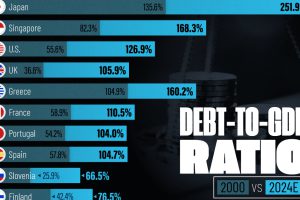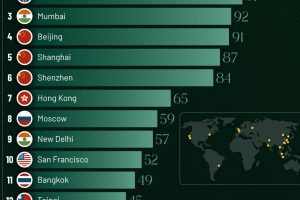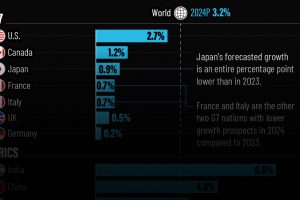Doing business means taking calculated risks.
Regardless of whether you are opening a lemonade stand or you’re a leading executive at a Fortune 500 company, risk is an inevitable part of the game.
Taking bigger risks can generate proportional rewards – and sometimes, such as for the companies you’ll read about below, the risk-taking backfired to queue up some of the biggest bankruptcies in U.S. history.
Going For Broke
Today’s infographic comes to us from TitleMax, and it highlights the 20 biggest bankruptcies in the country’s history.
Companies below are sorted by total assets at the time of bankruptcy.

There are times when companies are forced to push in all of their chips to make a game-changing bet. Sometimes this pans out, and sometimes the plan fails miserably.
In other situations, companies were actually unaware they were “all-in”. Instead, the potentially destructive nature of the risk was not even on the radar, only to be later triggered through a global crisis or unanticipated “Black Swan” events.
The Biggest Bankruptcies in the U.S.
Here are the 20 biggest bankruptcies in U.S. history, and what triggered them:
| Rank | Company | Year | Assets at Bankruptcy | Downfall |
|---|---|---|---|---|
| #1 | Lehman Brothers | 2008 | $691 billion | 2008 financial crisis |
| #2 | Washington Mutual | 2008 | $328 billion | 2008 financial crisis |
| #3 | Worldcom Inc. | 2002 | $104 billion | Accounting scandal |
| #4 | GM | 2009 | $82 billion | Massive debt |
| #5 | CIT Group | 2009 | $71 billion | Credit crunch |
| #6 | Pacific Gas & Electric | 2019 | $71 billion | Wildfires |
| #7 | Enron | 2001 | $66 billion | Fraud |
| #8 | Conseco | 2002 | $61 billion | Failed acquisition strategy |
| #9 | MF Global | 2011 | $41 billion | European sovereign bonds |
| #10 | Chrysler | 2009 | $39 billion | Massive debt |
| #11 | Thornburg Mortgage | 2009 | $37 billion | Declining mortgage values |
| #12 | Pacific Gas & Electric | 2001 | $36 billion | Drought |
| #13 | Texaco | 1987 | $35 billion | Contract dispute |
| #14 | FCOA | 1988 | $34 billion | Savings and loan crisis |
| #15 | Refco | 2005 | $33 billion | Accounting fraud |
| #16 | IndyMac Bancorp | 2008 | $33 billion | Mortgage market collapse |
| #17 | Global Crossing | 2002 | $30 billion | Plummeting world economy |
| #18 | Bank of New England | 1991 | $30 billion | Bad loans |
| #19 | General Growth Properties | 2009 | $30 billion | Failed acquisition strategy |
| #20 | Lyondell Chemical | 2009 | $27 billion | Decline in demand |
The data set on the biggest bankruptcies is organized by assets at time of bankruptcy. Therefore, they are not in inflation-adjusted terms, meaning the list skews towards more recent events.
This makes the impact of the 2008 financial crisis particularly easy to spot.
The events and consequences relating to the crisis (loan defaults, illiquidity, and declining asset values) were enough to take down banks like Lehman Brothers and WaMu. The after effects – including a slumping global economy – led to a second wave of bankruptcies for companies such as GM and Chrysler.
In total, nine of the 20 biggest bankruptcies on the list occurred in the 2008-2009 span.
A Dubious Distinction
You may also notice that one company was on the list twice, and this was not an accident.
Pacific Gas & Electric, a California company that is the nation’s largest utility provider, has the dubious distinction of going bankrupt twice in the last 20 years. The first time, in 2001, resulted from a drought that limited hydro electricity generation, forcing the company to import electricity from outside sources at exorbitant prices.
The more recent instance happened earlier this year. Facing tens of billions of dollars in liabilities from raging wildfires in California, the utility filed for Chapter 11 protection yet another time.





